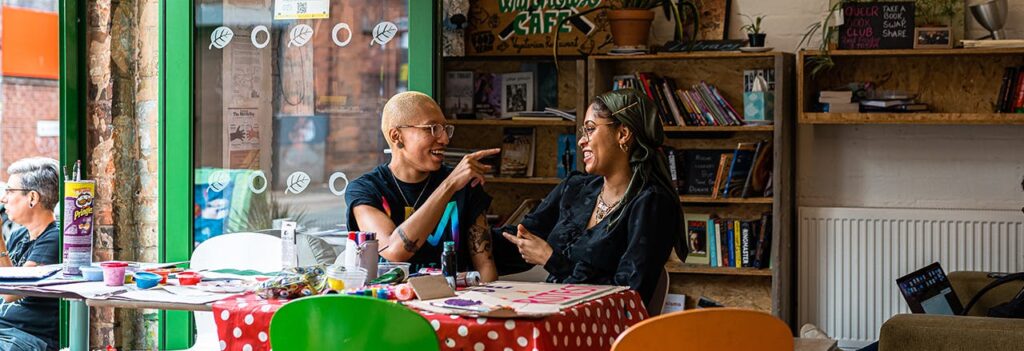A strategy for tackling loneliness: An update from DCMS

This blog post explores the work being done across government to address the stigma of loneliness, build the evidence base, and drive a lasting shift across sectors.

Overview
Five years ago, the UK published the world’s first ever cross-government strategy to tackle loneliness. Since its publication, other countries have followed suit and see this country as a leader in addressing loneliness. The Jo Cox Loneliness Commission was the impetus for driving this change; launched in 2017, the Commission convened organisations, charities and the government to highlight the scale of loneliness across society and develop a policy response to tackling it.
Since then, the government and its partners have invested almost £80 million to deliver against the strategy and improve social connectedness. We have worked in partnership not only across government departments, but also beyond. The community of individuals and organisations in the Tackling Loneliness Hub have played a vital role in building a more connected society, where people can have positive relationships that help them to thrive.
The 2018 strategy is a testament to government’s commitment to address loneliness, and has been instrumental in providing a shared statement of ambition. Our work continues to be guided by three strategic objectives:
- The first objective is to reduce the stigma around loneliness by building a national conversation to raise awareness.
- The second objective is to drive a lasting shift so that relationships and loneliness are considered in policy-making and delivery by organisations across society.
- The third objective is to ensure that we play our part in improving the evidence base on loneliness, making a compelling case for action.
Reducing the stigma
In order to tackle the stigma around loneliness, every year we run a communications campaign which helps build a national conversation on loneliness and connection. Our campaign activity has reached millions of people across the country, spreading the message that it’s OK to feel lonely sometimes. The Better Health – Every Mind Matters Loneliness campaign has gained a wealth of high-profile support – from the Prince and Princess of Wales to national supermarkets and the gaming industry. The purpose of this activity is that people feel able to talk about loneliness, and know where to access support.
Earlier this year our campaign encouraged people to ‘Lift Someone Out of Loneliness’, with a particular focus on young people aged 16-34: research has shown that young people are five times more likely to experience loneliness than people aged 65 and over.
Driving a lasting shift
Our second commitment is to drive a lasting shift so that everyone within and beyond government plays their part in tackling loneliness. We know that loneliness is a complex issue affected by areas including education, housing, community planning and transport, as well as health and social care. We are working hard to embed social connection in policy-making across government. The loneliness measure is now included in 11 government surveys, and action to tackle loneliness over the last five years has been wide ranging.
For example, the Department of Health and Social Care and NHS England have made great progress in improving the provision of social prescribing. Funding is now available for all primary care networks across England to recruit social prescribing link workers, and as of November 2022, we have seen over 1.3 million social prescribing referrals.
We are also tackling loneliness with transport – nearly £5 million has been invested in pilot projects across the country to trial new transport solutions to remove barriers to social connection. The evaluation for this programme will be released next year.
Improving the evidence base
Finally, our third objective is to improve the evidence base and we have significantly increased our shared understanding of loneliness over the past 5 years. To ensure we work collaboratively to build this evidence base, we have convened experts and academics through a Tackling Loneliness Evidence Group. The Evidence Group published a review of priority evidence gaps in January 2022. The Government has committed to updating the evidence gaps table annually and continues to work with the Evidence Group to fill the gaps highlighted in the review. This is vital to create a compelling case for action and establish what works to tackle loneliness.
For example, in December 2022, we published research exploring the factors associated with loneliness during the pandemic. This research found that young people, women, disabled people and people who live alone were more likely to experience loneliness both before and during the pandemic. At the start of Loneliness Awareness week this year we published new research looking at the relationship between loneliness and stigma. Findings suggest that stigma associated with loneliness exists and comes in three forms: an individual feeling shame or embarrassment (self stigma), individuals assuming others will have negative attitudes or beliefs towards them experiencing loneliness (perceived social stigma) and negative attitudes or beliefs towards a person experiencing loneliness (actual social stigma).
The research also demonstrates that normalising loneliness, tackling negative associations and encouraging conversations would help people experiencing loneliness feel less alone, help remove associated internal shame and anticipate more positive reactions from sharing their feelings. There is also the potential for these actions to address actual social stigma by addressing some of the more “stereotypical” or negative perceptions of loneliness.
Finally, on 4 September we will publish new research detailing what works to tackle loneliness, what interventions exist and how organisations currently evaluate their interventions.
Looking ahead
Looking ahead, we will continue to work across government and beyond. The publication of the Fourth Annual Report evidencing the government’s delivery against our commitments is testament to the fact that tackling loneliness continues to be a priority for the government.
Elsewhere in DCMS, we have invested in youth services, sports participation and volunteering opportunities to help promote social connections. Across government, there will be work to improve outcomes for care leavers, share best practice to tackle workplace loneliness, and maximise health and wellbeing in planning decisions. We will also continue to fund the National Academy for Social Prescribing for the next two years; target support for veterans and people with disabilities; and work with local government colleagues to boost the wellbeing of communities across the country.
Most importantly we couldn’t do this work without the support of every member in this Tackling Loneliness Hub to help better connect people across our society. We hope it is clear that the government remains committed to this important agenda, to tackling stigma, building the evidence base, and driving a lasting shift across sectors, so we can work together to tackle loneliness.




Responses